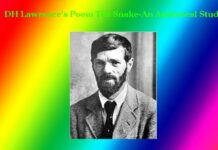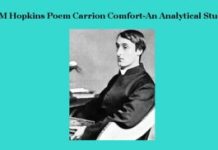Mysticism in the Poetry of Emily Dickinson
Mysticism in the Poetry of Emily Dickinson
Mysticism in the Poetry of Emily Dickinson
A true mystic is a person who believes that there is the existence of only one Supreme Soul ( the Divine soul or the soul of God) which expresses Himself through the objects of Nature (creations of God) and a human soul can make a communication with the supreme soul through three stages as—the purgation of sin, contemplation on God and at last union of human soul with the supreme soul. But in the broadest sense of the term, in literature, ‘mysticism’ involves such fundamental problems as—death, soul the immortality of the soul, God, heaven, hell, angel etc. The ultimate goal of a mystic person is to make spiritual contact with the soul of God. Emily Dickinson, a great poetess of America, is not a true mystic to the stickiest sense of the term; but many of her poems deal with the themes of death, soul, God, heaven, hell, angel etc. In this respect, she may be called a mystic poetess. An analysis of her poems clears us with this hypothesis.
Death is a theme that is ever-present in her poetry. She feels that death is an inevitable power that chases the human soul every moment. Emily Dickinson tastes death daily. In the poem “I felt a Funeral in my Brain”. She expresses her feeling as:
‘I felt a Funeral in my brain
And Mourners to and fro
Kept treading—treading—till it seemed
That sense was breaking through—’
The poetess thinks that death is a medium through which a human soul unites with the soul of God. If death comes to a person he enters into the state of God i.e. heaven forever. In the poem, The Soul Selects Her Own Society, she says:
‘The soul selects her own society
Then—shuts the Door—
To her divine Majority—
Present no more—.’
‘I Heard a Fly Buzz—When I Died’ is another poem dealing with the theme of death. In this poem, she experiences death by anticipation. She says:
‘I heard a fly buzz — when I died—
The stillness in the room
Was like the stillness in the Air—
Between the Heaves of Storm.’
“To Hear an Oriole Sing” is a poem in which she inclines to say that God expresses Himself through the objects of nature and hence she thinks that the song of an oriole may be divine. In the poetess’ words:
‘To hear an Oriole sing
May be a common thing—
Or only a divine.’
In the poem ‘Because I Could Not Stop for Death’ the poetess expresses her mystic belief that death leads a man to Eternity—where the human soul lives forever. She says:
‘I first surmised the horses’ heads
Were toward Eternity —’
In the poem ‘Behind Me Dips Eternity,’ the poetess again portrays her view on immortality and says:
‘Behind Me—dips eternity
Before me —immortality
Myself the term between —
Death but the Drift of Eastern Gray.’
The poetess thinks that death leads us to heaven, but to enter into heaven, the human soul must be purged of sin through suffering the agony of sin in hell. She says in ‘My Life Closed Twice Before it Close.’
‘Parting is all we know of heaven
And all we weed of hell.’
The above analyses of her major poems show us that the poetess experiences a contact with the Divine soul not directly but indirectly as she only anticipates the union of her soul with the Divine Soul through death. Hence she may be called a poetess inclined to mysticism. 0 0 0
Read More: The Theme of Love in the Poetry of Emily Dickinson
N. B. This article entitled ‘The Theme of Mysticism in the Poetry of Emily Dickinson’ originally belongs to the book ‘Emily Dickinson’s Poetry: A Thematic Study‘ by Menonim Menonimus.
Books of Literary Criticism by M. Menonimus:
- World Short Story Criticism
- World Poetry Criticism
- World Drama Criticism
- World Novel Criticism
- World Essay Criticism
- Indian English Poetry Criticism
- Indian English Poets and Poetry Chief Features
- Emily Dickinson’s Poetry-A Thematic Study
- Walt Whitman’s Poetry-A Thematic Study
- Critical Essays on English Poetry
- Tawfiq al-Hakim’s Novel: Return of the Spirit-An Analytical Study
- Tawfiq al-Hakim’s Novel: ‘Yawmiyyat Naib Fil Arayaf’-An Analytical Study
- Analytical Studies of Some Arabic Short Stories
- A Brief History of Arabic Literature: Pre-Islamic Period …
Related Searches:
- Mysticism of Emily Dickinson
- Mysticism in the Poetry of Emily Dickinson
- Emily Dickinson Biography
- Emily Dickinson-Poetry Foundation
- Emily Dickinson’s Collected Poems Themes
- Major Themes of Emily Dickinson’s Poetry
- Emily Dickinson: Poems and Poetry Analysis











